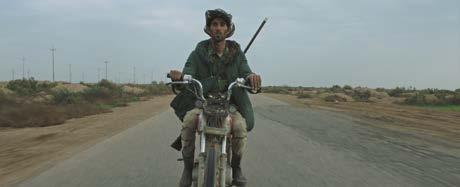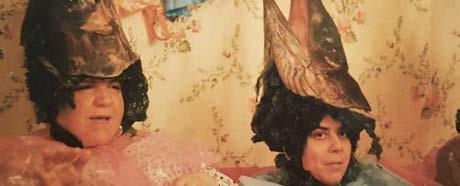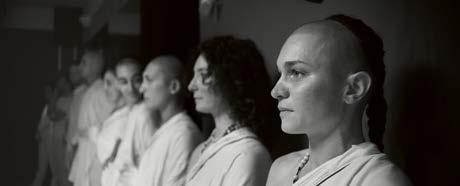
7 minute read
PRODUCER TALKS
PRODUCER Donatella Palermo
Advertisement
A Chat with Donatella Palermo
Interview by MARGHERITA BORDINO
D. Palermo
DONATELLA PALERMO
pictured with director Gianfranco Rosi: After his award-winning documentary Fire at Sea, she also produced his new effort Notturno, this year’s Italian Oscar entry.
PRODUCER Donatella Palermo
She won the 2012 Golden Bear at the Berlinale
with the Taviani brothers’ Cesare deve morire (Caesar Must Die). In 2016, she went on to win the same award with Gianfranco Rosi’s Fuocoammare (Fire at Sea), a film that propelled her into Oscar history with a nomination for Best Documentary in 2017. Sicily-born Donatella Palermo is one of the many female producers who, in recent years, have contributed to the renaissance of Italian cinema del reale, or documentary filmmaking.
A very young Donatella Palermo wrote comics, but then became an acclaimed producer. When did cinema enter your life? DONATELLA PALERMO I am from the provinces. And in the provinces, it’s really quite difficult to say, “I want to make films.” When I started out, I’d collect stories from friends and turn them into comic strips; it was fun, but something was missing. I’m a sociable person and prefer working with others rather than being alone. One day, I found a lost dog on the street and brought it home. I placed ads in the newspaper and put posters up in stores. It turned out that the dog belonged to an American producer. We became friends, and she’s the one who first got me into film.
A while ago you said, “The craft of producing is a kind of school where you never finish learning.” What have you learned thus far? DP I’m not an artist. I don’t have that type of talent. But I’m a good advocate: I defend artists, support them, understand their dispositions. For the rest, cinema is changing and always will. In these months I’ve been thinking about what kind of films people will want to see after their experience in 2020. If someone had told me before that I’d be locked in my house for months and afraid to hug people, I wouldn’t have believed them. And today I am, as much as anyone, a different person in an imperceptible way. So what is it that people want to talk about next? I’m reflecting on the films of the post-war period, when a completely new type of filmmaking arose. I think that producers – and filmmakers themselves – will now have to figure out what the sentiment of this era is, and it’s not at all easy.
We’ll need to reflect about the way we watch films as well... DP For me, the cinema is everything. It’s magic. I can’t imagine a film without the actual movie theater. I used to be a projectionist myself and know exactly what it means when the projector is turned on in a darkened cinema, and the film begins. It’s not the same as turning on the television – not in any way, shape or form.
What does producing a film actually mean to you? DP Giving life to something that is immaterial at the beginning, then becomes a piece of paper, then an image; the creativity of many people flows within that image. For me, a film is a fixed thought. I have to believe in the director and his or her story. That’s why I let my intuition guide my choices, rather than logical reasoning. I am deeply moved by cinema del reale, which I discovered thanks to Gianfranco Rosi. He helped me discover a different kind of filmmaking, in which everything has an ethical value. Rosi says that the most difficult thing is establishing that distance from reality when one is faced with the camera. That distance holds the key to the story, to your feelings. With that concept alone, he opened up a world of understanding to me. I learned that improper distance can mean overpowering, even violating, both the image and its meaning.
One particularly important meeting for you was with director Roberta Torre, whose Tano da morire (To Die for Tano) you produced. How did that film, a Venice festival success, come about? DP Roberta came to me with the idea for a documentary about Tano Guarrasi, a small-time Mafioso. A fantastic, true story! We decided together that this story should be… a musical. It was a crazy idea to make people laugh about the Mafia, to make real Mafiosi dance and sing: No wonder I couldn’t raise the money for it. Then one day Giovanni Tantillo, then the director of Rai1, advised me to make a
PRODUCER Donatella Palermo
Stemal Entertainment



Middle East docudrama Notturno, Mafia musical To Die for Tano, cult documentary Faith: Difficult projects are in good hands with Donatella Palermo.
little documentary on Tano, to see if it could open other doors. So we made Appunti per un film su Tano (“Notes for a film about Tano”), where we told his story and showed the auditions we had done for the hypothetical film. We presented this little piece at Venice Film Festival Critics’ Week, where it was a success and allowed us to make the whole film. Without that bold idea we might never have made To Die for Tano.
And then came your encounter with the Taviani brothers. And Caesar Must Die was awarded a very important accolade: the Golden Bear at the Berlinale. DP That was a magical experience. We were filming in a prison, in the maximum-security block that housed the murderers and drug traffickers. One of our protagonists had killed four people in prison. Our protagonists’ individual life stories were terrible and we never wanted to force them into the open. But while improvising a scene of the film, one of them said “My life is no longer the same now that I have experienced art,” and that’s how I came to understand that art changes people’s lives. When we came back from Berlin, we went to Rebibbia Prison to show them the Golden Bear and that was incredible. Everyone took pictures of themselves with the award and sent them to their loved ones. Suddenly, their families were proud of them for the first time. And then later on, with Fire at Sea, I experienced first-hand that when cinema is art, it can change society.
More recently, you produced Rosi’s new documentary, Notturno. That film and Fire at Sea took one and three years to shoot, respectively. As a producer, what does time mean to you? DP Regarding Gianfranco Rosi – who shoots alone, takes care of photography and sound, rarely has an assistant – time is not a luxury but an unavoidable necessity. In my opinion, Rosi already is one of the greats of film history. I worked with him from Rome throughout the making of Notturno. I had his route maps with me and followed him through Syria, Lebanon and Iraq. My day was punctuated by phone calls with him. I felt that I had taken a journey of my own, from inside my office. I think Notturno is the most important film I’ve ever made. It has ethical, historical and artistic value.
The year 2020 was extraordinary for cinema as well. Very few festivals were held with physical attendance, but among them was the Berlinale, where Faith was presented. Sadly the director, Valentina Pedicini, very recently passed away. DP Valentina was an extraordinary director, and one of the finest human beings I have ever met. She gave so much love, and many of us mourn her. We already had plans for another film. Now it’s just an idea on a sheet of paper. Vale taught documentary filmmaking in Palermo, and her students wrote something really beautiful: “Now all we can do is dream about the films she would have made.” My sentiments exactly. We all lost something very dear when Valentina passed away. When we screened Faith at the IDFA, two beautiful Variety articles appeared within one week. I spoke to Gianfranco Rosi on the phone and, even with machine guns and sirens in the background, he said to me happily, “You see, finally Valentina has been recognized by international cinema, as she rightly deserves!” And he was right. Also, through Valentina, I met South Tyrol’s IDM Film Commission, who showed great understanding for our film.






